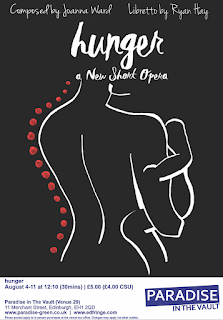Review: Tragedy Unfortunately Meets Comedy in Macbeth at ROH
 |
| Image: the witches in Macbeth at ROH. Copyright ROHClive Barda, 2011. |
Black, white and red: the three colours that form the basis of Phyllida Lloyd’s production of Verdi’s Macbeth for the Royal Opera House, perfectly depicting the deathly political power struggle at the heart of this opera. Forget 11th-century Scotland, however; Lloyd instead sets much of her Macbeth in a dark, claustrophobic room, highlighting how the Macbeths become increasingly trapped by their quest for power. On the whole, Lloyd’s is a production that captures the character of this opera. However, although the ‘bigger picture’ is here painted pretty convincingly, this production is somewhat lacking when it comes to the smaller details.
The first problem here was essentially made apparent from the opening of the performance. Lloyd chose to have the chorus of witches present on stage for much of the opera; while this emphasises the mysticism inherent in the plot and undoubtedly adds a rather creepy touch, the choreography here proved problematic. While some appearances of the witches were highly effective, such as when the curtain first rose to reveal a sea of women clad in red and black, others were less so; attempts to make them appear frightening often just seemed a little farcical, turning this tragedy into something of a comedy. One other problem also arose in the opening scene; while it may perhaps be challenging for production teams to show realistic dead bodies on stage, this production’s use of bodies that were so obviously made of plastic seemed to be a poorly judged choice. The opening reveal of the body of the Thane of Cawdor, which marks the first step in the witches’ prophecy becoming true, was again far more comedic than dramatic; in a strangely topical reference for an Easter Monday performance, a plastic dead body was hoisted up on the stage, seeming oddly reminiscent of Christ on the cross and proving quite a distraction from what was an otherwise relatively effective scene.
This production did, however, also offer some more thoughtful interpretations of the opera. Lloyd’s decision to suggest that the Macbeth’s childlessness lay behind their ruthless quest for power was an interesting touch, although I am somewhat hesitant to admire the implication that the lack of children necessarily brings about the development of murderous bloodthirst. The visual presentation of coveted positions of power was also effective; characters such as (pre-murder) King Duncan, or the prophesied kings fathered by Banquo, were dressed head-to-toe in gold, presenting their power as excessive decadence and contrasting strongly with the colour palette used for the other characters. This came to a peak at the end of Act II, when the Macbeths were crowned King and Queen; their sequinned gold costumes demonstrated how grotesque and excessive their quest for power had become, complemented by the decadent velvet outfits of the chorus. While their gold costumes did initially make me think that this was perhaps Macbeth: The Disco Version (a show I probably would enjoy), I felt that this strengthened the overall portrayal of power and power struggles within this production, as well as making for some pretty reflections on the ceiling of the opera house!
Unlike the somewhat-shaky nature of the staging, musically, this performance was very strong. While I have admittedly been bitter about missing out on seeing Anna Netrebko as Lady Macbeth, Anna Pirozzi offered a formidable portrayal of the anti-heroine, demonstrating her possession of a voice with great strength, range and emotional depth. Željko Luĉić gave a similarly convincing performance of the role of Macbeth, capturing well the character’s descent into emotional turmoil. Special mention should also go to David Junghoon Kim for his performance of Macduff’s Act IV aria ‘Ah, la paterno mano’, a moving performance for which he received what was perhaps one of the warmest rounds of applause of the night. At times when the visual elements of this production were confusing or somewhat lacking, the strong musical performances by the leads more than made up for it. This production of Macbeth was overall a highly enjoyable night, even if at times this was due to the humorous effect of some staging misjudgements; with slightly more attention being paid to the minor details, this has the potential to be a very strong production.

Comments
Post a Comment